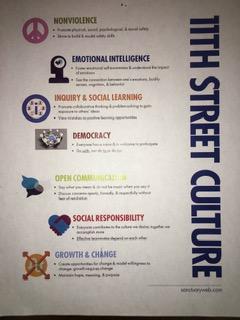The Role of Trauma-Informed Healthcare by Sahar Chaudhary
During the first week of PSO, there was a lot of discussion on adverse childhood experiences and their impact on health outcomes. According to the US Department of Health and Human Services, in the United States, 61 percent of men and 51 percent of women report exposure to at least one lifetime traumatic event. 90% of clients in public behavioral health care settings have experienced trauma. The discussion around adverse childhood experiences during PSO provided a good introduction to the culture at my host site, 11th Street Family Health Services, a part of FPCN (Family Practice and Counseling Network).
In several ways, 11th Street and the rest of FPCN clinics deviate from traditional models of healthcare to provide for the people they serve. FPCN has adopted a model of trauma-informed care, meaning it takes into account the ways childhood trauma has impacted not only patients, but staff as well. Providers shift their approach to patients from asking themselves what is wrong with a patient to asking themselves what happened to a patient to make them exhibit certain behaviors. This means moving from a reactive approach in which problems are “fixed” once a critical point is reached to a proactive one in which preventive care is emphasized. Viewing patients through this lens leads to more compassionate and holistic treatment.

FPCN is set up with “everything under one roof” meaning patients can come to 11th Street for primary care, behavioral health services, dental care, social work, and physical therapy. There are art and music therapy services, Tai Chi, meditation, and other classes to help patients and community members manage stress. The gym is open for members of the community regardless of whether they are patients. Because it is a federally qualified health center, uninsured patients can be seen at a sliding fee scale. Community members’ opinions were taken into account when building the clinic and continue to be taken into account each month during a meeting with advisors in the community. All these considerations take steps in making healthcare more patient-centered and more accessible to 11th Street’s surrounding community.
Serving as a patient advocate at FPCN 11th Street, my primary role is to assist senior citizens with education and access to insurance and social services including SNAP benefits. Providing these services to patients is made easier due to integration. Providers and social work staff refer patients to one another’s services to make sure all aspects of health from nutrition to housing to mental health are taken care of. While providing any service, I remind myself never to lose perspective and always to approach others with compassion and humility. In order to help anyone, I have to hear them, know them, and learn from them. Context provided at trainings through PSO and through 11th Street will help me work to the best of my ability to apply these values and decrease barriers for patients.
[Image Description: Above is an image of a flyer showing different aspects of trauma-informed care that are valued by 11th Street, including growth and change, social responsibility, open communication, democracy, inquiry and social learning, emotional intelligence, and nonviolence.]
[Preview Image Description: Above is a front shot of FPCN 11th Street Family Health Services.]